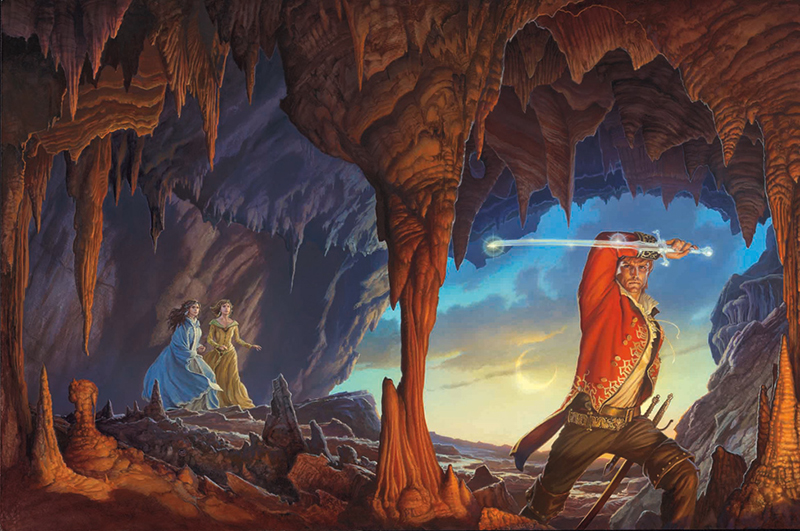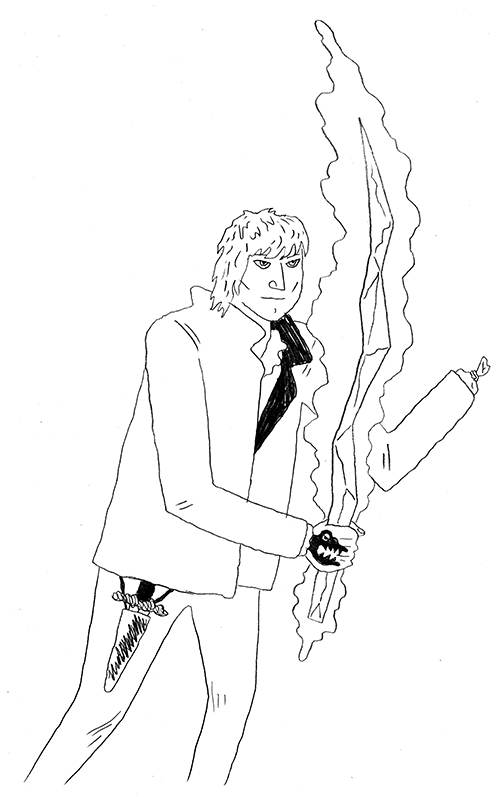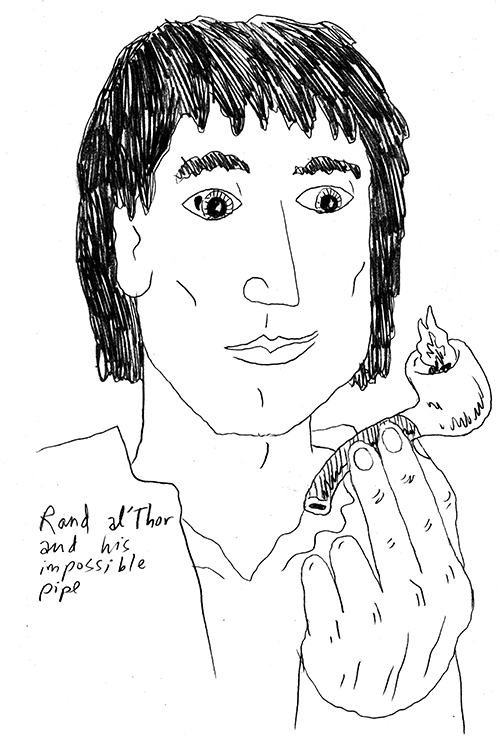Sorry, the comment form is closed.
I’m going to discuss the much hyped final scene of the Wheel of Time series, conceived by Robert Jordan from the very beginning*, written before he passed away, and incorporated virtually unchanged in the final book.
Michael Whelan’s cover painting for A Memory of Light.
*Robert Jordan: “I started thinking about what would turn into the Wheel of Time more than 15 years ago, and the first thing that I thought of that was really solid was the last scene of the last book.” – From this chat.
Full A Memory of Light spoilers within.
I didn’t expect it, but I have a feeling that Robert Jordan’s ending is going to be a bit controversial among longtime fans. There are so few models for what the Wheel of Time did (a fourteen book series that’s one long continuing series) that it’s hard to have expectations. But given the various artifacts in the series that provide visions of the future, and the number of pages and words expanded on building up the world, its characters, and the various subplots, I was expecting a long, thematically important denouement, like The Return of the King. Instead, after thousands of pages of prophecy, anguish, romance, gory warfare, and wizard battles, we’re given a 16-page epilogue (in the first hardcover edition) that leaves so much unresolved. The hero survives and rides towards the horizon, bereft of his mighty powers but possessing a new understanding of the fundamental nature of reality. Humanity stands divided and decimated in a shaky truce, the future of everyone we’ve been made to care about uncertain.
It’s hard for me to separate my expectations and long involvement with this series, the emotions and time I’ve invested in it, from what it is. Future readers who can read the whole thing from start to finish without having to wait years for future volumes (and not knowing whether there would be future volumes) will probably react differently. I was definitely unsettled at first but it’s impossible for any ending to match every fan’s formless dream of a perfect ending.
My interpretation of the scene depicted in Michael Whelan’s cover (I’m not trying to match the book’s descriptions of Callandor).
I’ve been mulling it over for the past couple of days (I was able to snag a copy early) and ultimately, I’m satisfied. I feel like Jordan is slyly smiling at all of his fans out of the past.** I much prefer what Robert Jordan gave us to the Harry Potter epilogue. Rather than giving us unsatisfactory endings that sweep all the societal issues raised during the series under the rug like JK Rowling, Jordan just leaves it all hanging. But even though we aren’t vouchsafed a canonical continuation of the story, A Memory of Light contains several glimpses of possible futures to feed our imaginations (and probably thousands of fan fictions).
Robert Jordan’s ending deepens and develops the theme of his series. The importance of storytelling is key. Myth and legend tie everything up and resolve all plots but real history never ends so neatly. Throughout the series, the messianic savior and destroyer, Rand al’Thor, struggles against the narratives that try to define and limit him. There are the prophecies that, although they’re often obscure, say what he’ll do and doom him to an early, bloody death. He wrestles with the legacy of his previous incarnation, who killed his family in a psychotic episode and caused the earth to be reshaped in earthquakes, fires, and floods. People fear Rand. Rumors make him out to be a brutal murderer and tyrant. In the final conflict, Rand and the the embodiment of ultimate evil battle by weaving competing stories of the world they’ll make if they’re victorious.
My interpretation of Rand and his impossible pipe (Robert Jordan’s “hook”).
As I’ve mentioned, in the ending Rand achieves a fundamental understanding of his reality. Throughout the series we’re told that life is a dream that we awake from in death. All possible worlds exist, even if they’re hard to reach, and they’re all embedded in an endless dreamscape where anything you imagine can be brought into being. In the last scene, Rand can access this power, even while awake and living in the real world. He has control of his own narrative. He has escaped all stories except the ones he tells. He’s anonymous and free.
**Robert Jordan: “…in the last scene of the last book, I intend to set a small hook for what some may see as future books. But I will walk away and not look back.” – From this interview.




I only started the WoT series 2 years before Jordan passed but even in that short time frame I have read the series start to finsh(as far as whatever was out at the time) 6 times. In modern fantasy of sleeze, and no hero’s just a point of view character(see Game of Thrones), I found the ending satisfactory. Truly as Stephen King often states, “its not the destination,its the journey”.
That said, I thought a few things were out of place. The demise of Mashadar is foremost. While it actually didn’t bother me, its rapidity struck me as so out of the norm(in a 14 book series). Secondly, perhaps my least favorite character our little Sean Chan empress never really got knocked around like every other character(including the dark friends). I felt a nice chapter of someone snapping a collar on her neck and dominating her, would have put some empathy in me for her.
I did feel the extra time was well spent on the final volume, much more of Jordan came through as opposed to books 11+12, and all things considered a worthy finish to the series. Thanks for the info on Jordan’s final hook, which is what brought me to google it and stumble upon your well written blog with nice info from interviews.
Comment by Loyd S — February 24th, 2013 @ 4:30 am
Thanks for the thoughtful comment!
It’s weird how an event can feel rushed in a 900-plus page book but I agree with you on Mashadar. As far as the Empress goes, maybe Tuon would’ve been through more turmoil in the sequel trilogies set in Seanchan that Jordan had planned. I know that I (along with a lot of other people) was hoping that she’d develop her outlook more by the end, but I think that considering history, it’s more realistic for sweeping social change to take a generations.
Comment by William Cardini — February 25th, 2013 @ 11:34 pm